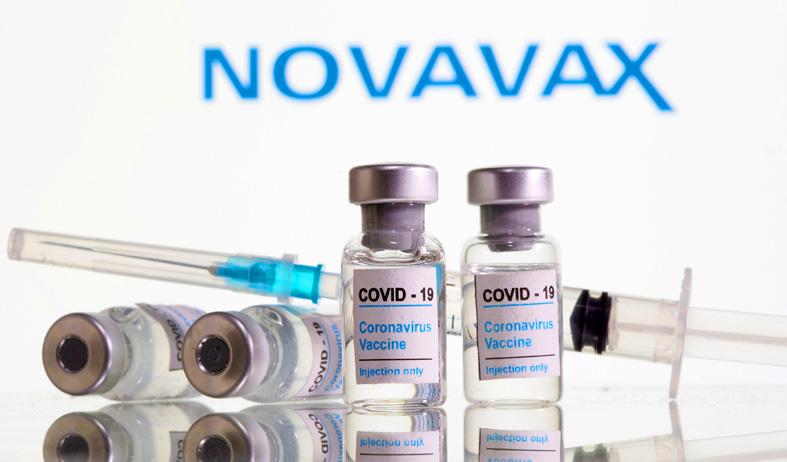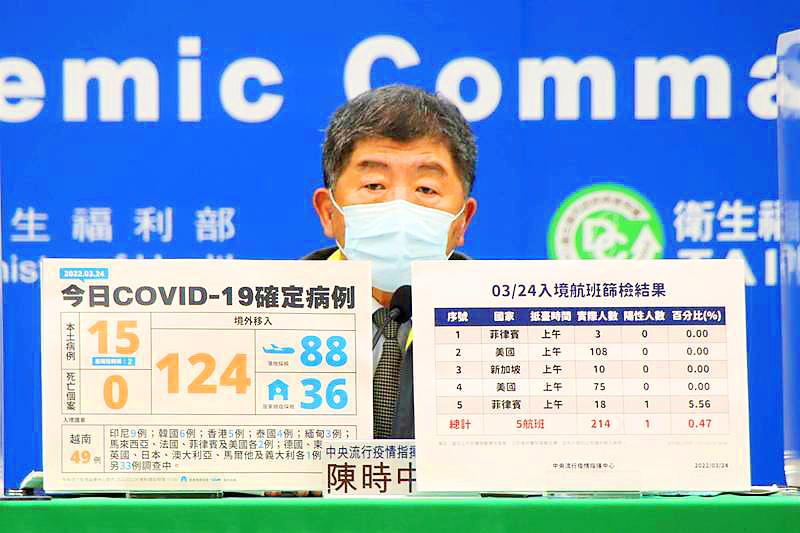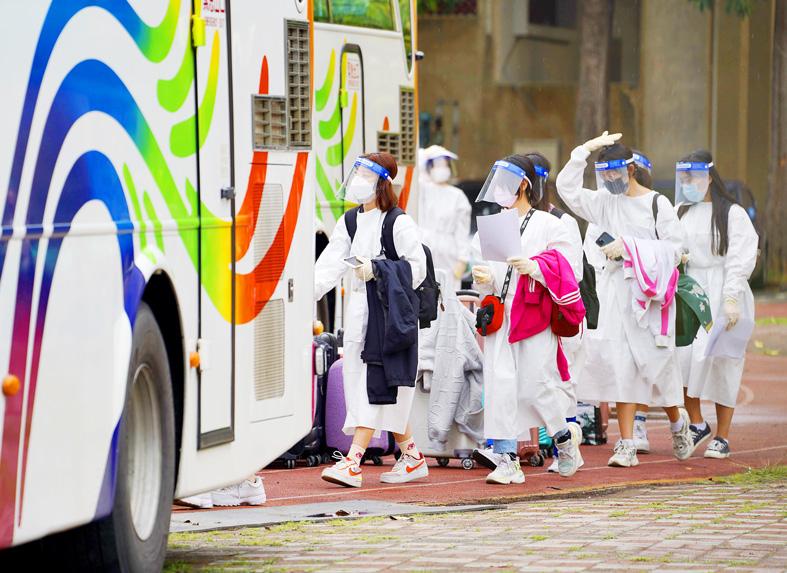Taiwan has ordered about 2 million doses of the Novavax COVID-19 vaccine through the global vaccine sharing initiative COVAX, Minister of Health and Welfare Chen Shih-chung (陳時中) said yesterday.
However, it is not clear when the first shipment would arrive and how many doses it would contain, said Chen, who heads the Central Epidemic Command Center (CECC).
The Food and Drug Administration is reviewing technical data on the Novavax vaccine as part of its emergency use authorization process, he added.

Photo: Reuters
The Advisory Committee on Immunization Practices (ACIP) has recommended that the vaccine be given to people aged 18 or older as first, second or booster shots, Chen said.
The interval between the first and second doses should be 28 days, and a booster shot should follow 12 weeks after a second dose, he said.
Asked whether there is interest in the vaccine in Taiwan, Chen said that subunit vaccines like Novavax are suitable for people who are allergic to other types of COVID-19 vaccines offered in Taiwan, or those who are put off by the potentially more severe side effects of other vaccines.

Photo courtesy of the CECC
While the locally developed Medigen vaccine is also a subunit vaccine, it has not yet been approved by the WHO, which could lead people to choose the Novavax vaccine instead, he said.
Taiwan has ordered 4.76 million COVID-19 vaccine doses from COVAX, of which 1.02 million doses, all of the AstraZeneca brand, have been delivered, the CECC said.
Meanwhile, the ACIP said that a meeting with experts recommended against giving COVID-19 vaccines to children aged 5 to 11, and advised against administering booster shots to those aged 12 to 17.

Photo: CNA
In other developments, Taiwan reported 15 domestic COVID-19 cases, including 13 from a new cluster at a chemical plant in Kaohsiung.
An employee at the plant began to show symptoms on Wednesday, and her test results came back positive yesterday, Chen said.
Subsequent testing found that 10 other employees had also contracted COVID-19, as well as two of their family members, one of whom is a high-school student, he said.
The student’s classmates and homeroom teacher have tested negative and have been asked to quarantine, Chen said.
The 45 employees at the chemical plant who tested negative are also in quarantine, and the plant is to suspend operations, he said.
The CECC has not yet identified the source of the cluster, he said.
The other two domestic cases tested positive in quarantine, and their infections are related to a cluster of unknown origin centered on a wedding in Chiayi City, Chen said.
Each of the local cases reported yesterday had received either two or three doses of a COVID-19 vaccine, the CECC said.
Taiwan yesterday also reported 124 imported cases of COVID-19, the highest daily total recorded since the pandemic began, Chen said.
The previous record was on Saturday last week, when 120 imported cases were reported.

MAKING WAVES: China’s maritime militia could become a nontraditional threat in war, clogging up shipping lanes to prevent US or Japanese intervention, a report said About 1,900 Chinese ships flying flags of convenience and fishing vessels that participated in China’s military exercises around Taiwan last month and in January last year have been listed for monitoring, Coast Guard Administration (CGA) Deputy Director-General Hsieh Ching-chin (謝慶欽) said yesterday. Following amendments to the Commercial Port Act (商港法) and the Law of Ships (船舶法) last month, the CGA can designate possible berthing areas or deny ports of call for vessels suspected of loitering around areas where undersea cables can be accessed, Oceans Affairs Council Minister Kuan Bi-ling (管碧玲) said. The list of suspected ships, originally 300, had risen to about

DAREDEVIL: Honnold said it had always been a dream of his to climb Taipei 101, while a Netflix producer said the skyscraper was ‘a real icon of this country’ US climber Alex Honnold yesterday took on Taiwan’s tallest building, becoming the first person to scale Taipei 101 without a rope, harness or safety net. Hundreds of spectators gathered at the base of the 101-story skyscraper to watch Honnold, 40, embark on his daredevil feat, which was also broadcast live on Netflix. Dressed in a red T-shirt and yellow custom-made climbing shoes, Honnold swiftly moved up the southeast face of the glass and steel building. At one point, he stepped onto a platform midway up to wave down at fans and onlookers who were taking photos. People watching from inside

Japan’s strategic alliance with the US would collapse if Tokyo were to turn away from a conflict in Taiwan, Japanese Prime Minister Sanae Takaichi said yesterday, but distanced herself from previous comments that suggested a possible military response in such an event. Takaichi expressed her latest views on a nationally broadcast TV program late on Monday, where an opposition party leader criticized her for igniting tensions with China with the earlier remarks. Ties between Japan and China have sunk to the worst level in years after Takaichi said in November that a hypothetical Chinese attack on Taiwan could bring about a Japanese

STREAMLINED: The dedicated funding would allow the US to transfer equipment to Taiwan when needed and order upgraded replacements for stockpiles, a source said The US House of Representatives on Thursday passed a defense appropriations bill totaling US$838.7 billion, of which US$1 billion is to be allocated to reinforcing security cooperation with Taiwan and US$150 million to replace defense articles provided to the nation. These are part of the Consolidated Appropriation Act, which the US House yesterday passed with 341 votes in favor and 88 against. The act must be passed by the US Senate before Friday next week to avoid another government shutdown. The US House Committee on Appropriations on Monday unveiled the act, saying that it allocates US$1 billion for the Taiwan Security Cooperation Initiative